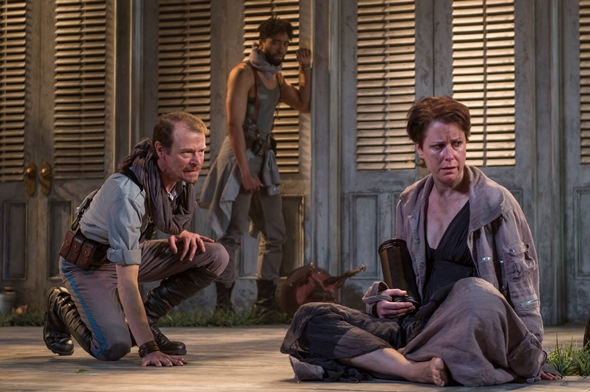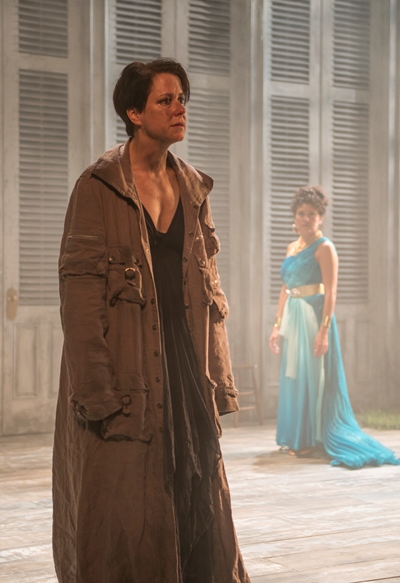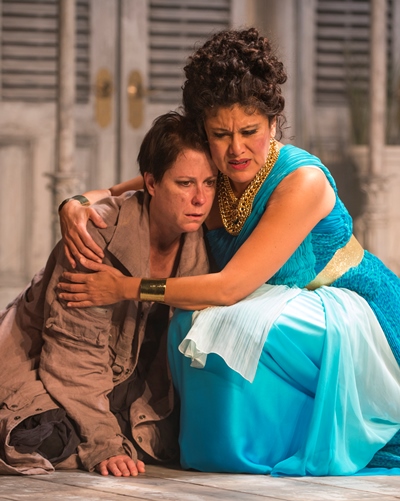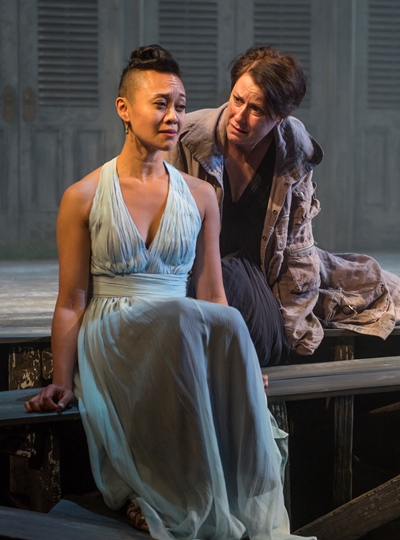‘Electra’ at Court: As a bloody legend closes, mournful daughter pines for two more deaths
 Review: “Electra” by Sophocles, at Court Theatre through Dec. 11. ★★★★
Review: “Electra” by Sophocles, at Court Theatre through Dec. 11. ★★★★
By Lawrence B. Johnson
Electra grieves and seethes, and waits. In Sophocles’ “Electra,” the classic Greek tragedy of vengeance, now starring Kate Fry in an earthy, understated take on the title role at Court Theatre, the waiting game is all.
One day, Electra’s hatred for her murderous mother Clytemnestra will be requited; one day, her prince will come. But the prince Electra awaits is her own, long-absent brother Orestes. Surely he will avenge the murder of their father, King Agamemnon, by this woman and her illicit, usurping consort.
 And yet, in truth, Electra waits against hope. She’s had no word from Orestes since, as a small child in that long-ago, he was spirited away to safety by a servant. That was when Aegisthus took Agamemnon’s place in Clytemnestra’s bed and on the throne of Argos.
And yet, in truth, Electra waits against hope. She’s had no word from Orestes since, as a small child in that long-ago, he was spirited away to safety by a servant. That was when Aegisthus took Agamemnon’s place in Clytemnestra’s bed and on the throne of Argos.
What’s really going on here is a long story; in fact, “Electra” is the last of three annual installments – plays by three different Greek playwrights, all translated by University of Chicago classics scholar Nicholas Rudall – presented at Court to frame the whole narrative, the full circumstance of Clytemnestra’s action against her husband and Electra’s soulful aching for retribution.
Previously, on the Court stage: In Euripides’ “Iphigenia at Aulis,” a massive Greek force under Agamemnon’s command is bound for Troy in ships to retrieve his sister-in-law Helen, who has been abducted. But while the Greek ships are put in at Aulis, angry gods stop the winds, and the priests say a specific sacrifice must be made before the armada will be allowed to continue: Agamemnon must cede the life of his own daughter, Iphigenia. On the false pretense that he has arranged immediate marriage for her with the Greek hero Achilles, Agamemnon summons the girl and her mother to Aulis, where over the stupefied objections of Clytemnestra, the sacrifice is made.
 In Aeschylus’ “Agamemnon,” the war-weary king returns home after 10 years on the battle front, packing the Trojan seer Cassandra as his victory prize. Clytemnestra, still angry over the slaughter of Iphigenia, has taken up with Aegisthus and together they have plotted to murder the king upon his arrival. Still, Clytemnestra wavers – until she spots her husband’s beautiful trophy Cassandra in his chariot amid the golden vases and statuary and other spoils of war. Quid pro quo, she takes Agamemnon’s life for Iphigenia’s.
In Aeschylus’ “Agamemnon,” the war-weary king returns home after 10 years on the battle front, packing the Trojan seer Cassandra as his victory prize. Clytemnestra, still angry over the slaughter of Iphigenia, has taken up with Aegisthus and together they have plotted to murder the king upon his arrival. Still, Clytemnestra wavers – until she spots her husband’s beautiful trophy Cassandra in his chariot amid the golden vases and statuary and other spoils of war. Quid pro quo, she takes Agamemnon’s life for Iphigenia’s.
And thus we come to the finishing play, or end game, in this bloody cycle of hubris, bloodshed and reciprocity.
In a sense, Sophocles’ drama might be viewed as a mash-up of “Hamlet” and “Waiting for Godot,” with everything – the tumult and the nullifying inaction – taking place in Electra’s head. There’s very little action. Fry’s benumbed, morose, grimy Electra, implacably lamenting her father’s murder, openly reviles her mother Clytemnestra (Sandra Marquez). In director Seret Scott’s elegantly poised and patient concept, Electra hears counsel from a chorus of three handmaids, their speech often lifted in lyric cantillation. Her sister Chrysothemis (the much better dressed Emjoy Gavino), who has accommodated herself to the family reorganization, apparently busies herself accessorizing. She would have Electra get over it, get a life, get out of the mud.
 Then a stranger appears with a devastating report: Orestes has been killed in a chariot race. The messenger even bears Orestes’ ashes. All hope is lost – but only momentarily. It is Orestes himself (Thomas J. Cox) who carries his purported remains; sister and brother joyfully reunite; and vengeance is swift. Orestes proceeds directly to kill their mother – but off-stage. The usurper Aegisthus (Michael Pogue), arrogant and authoritarian, enters. Clytemnestra’s blanketed corpse is dragged before him; when he pulls back the cover, he knows the game is up. (This feels like a “Godfather” moment: Orestes follows the doomed interloper off-stage to kill him. Greek stage deaths never happened in view.)
Then a stranger appears with a devastating report: Orestes has been killed in a chariot race. The messenger even bears Orestes’ ashes. All hope is lost – but only momentarily. It is Orestes himself (Thomas J. Cox) who carries his purported remains; sister and brother joyfully reunite; and vengeance is swift. Orestes proceeds directly to kill their mother – but off-stage. The usurper Aegisthus (Michael Pogue), arrogant and authoritarian, enters. Clytemnestra’s blanketed corpse is dragged before him; when he pulls back the cover, he knows the game is up. (This feels like a “Godfather” moment: Orestes follows the doomed interloper off-stage to kill him. Greek stage deaths never happened in view.)
In a surprising and clever touch, the arm’s-length objectivity of Sophocles’ play gains both immediacy and energy from the unlikeliest of sources: a semi-transparent wall created by set designer Scott Davis that extends the width of the stage, through which one glimpses indistinct activities within the household – notably the chasing down and slaying of Clytemnestra. The imagery is all quite sketchy and suggestive, but in the end very powerful.
Related Links:
- Performance location, dates and times: Details at TheatreinChicago.com
- Preview of Court Theatre’s complete 2016-17 season: Read it at Chicago On the Aisle
Tags: Court Theatre, Electra, Emjoy Gavino, Kate Fry, Michael Pogue, Sandra Marquez, Scott Davis, Seret Scott, Sophocles, Thomas J. Cox

